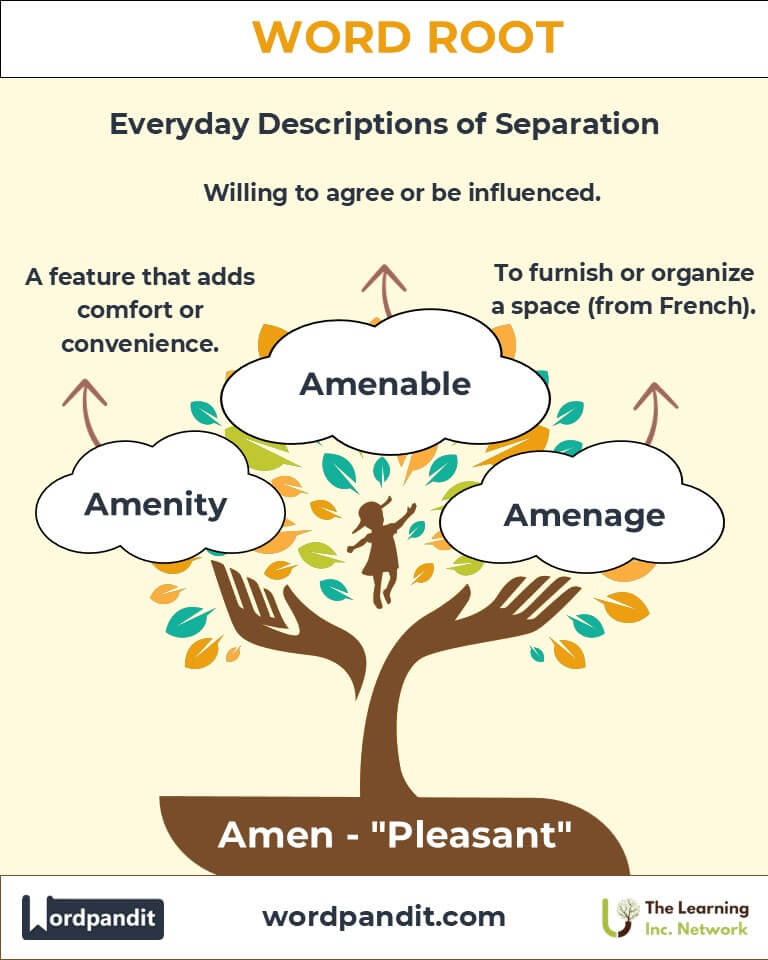Amen: The Root of Pleasantness in Language and Society
Explore the charm of the root "amen," meaning "pleasant," from its origins to its presence in words like "amenity" and "amenable." This root enriches our understanding of language's connection to harmony and civility in various contexts.

Table of Contents
- Introduction: The Essence of "Amen"
- Etymology and Historical Journey
- Mnemonic: Unlocking the Power of "Amen"
- Common "Amen"-Related Terms
- "Amen" Through Time
- "Amen" in Specialized Fields
- Illustrative Story: "Amen" in Action
- Cultural Significance of the "Amen" Root
- The "Amen" Family Tree
- FAQs About the Amen Word Root
- Test Your Knowledge: Amen Word Root Quiz
- Conclusion: The Enduring Legacy of "Amen"
1. Introduction: The Essence of "Amen"
When we think of pleasantness, comfort, or agreeability, we might not immediately consider the root "amen." Pronounced uh-men or ah-men, this root has its origins in Latin, where it signifies something pleasant or agreeable. From the soothing qualities of "amenities" to the adaptable nature of "amenable," this root adds a touch of harmony to both language and society.
2. Etymology and Historical Journey
The root "amen" traces back to Latin amoenus, which means "pleasant" or "delightful." Over time, this root found its way into English through Old French, influencing words associated with agreeability and comfort. Its evolution highlights its enduring role in fostering connection and civility.
3. Mnemonic: Unlocking the Power of "Amen"
To remember "amen," think of a tranquil park—filled with amenities like benches and fountains—where everyone feels at ease.
Mnemonic Device: "Amen adds harmony to life, making it a pleasant journey for all."
4. Common "Amen"-Related Terms
- Amenity (uh-MEN-uh-tee): A feature that adds to the comfort or convenience of a place.
Example: "The resort’s amenities included a spa and a heated pool, making it a luxurious retreat." - Amenable (uh-MEE-nuh-buhl): Willing to agree or open to suggestions.
Example: "The manager was amenable to the team’s proposal for a flexible work schedule." - Amicable (AM-i-kuh-buhl): Characterized by friendliness and goodwill.
Example: "Their divorce was surprisingly amicable, with both parties agreeing to the terms peacefully." - Amity (AM-i-tee): Friendly relations or peaceful coexistence.
Example: "The treaty brought lasting amity between the two nations." - Amiable (AY-mee-uh-buhl): Having a pleasant and friendly disposition.
Example: "Her amiable personality made her a favorite among her colleagues."
5. "Amen" Through Time
- Amenity: Initially referred to features of landscapes in the 14th century, emphasizing their beauty and comfort.
- Amenable: Gained prominence in the 16th century, describing individuals or entities willing to comply or adapt.
- Amicable: Once reserved for formal relations, it has become a term of general friendliness.
6. "Amen" in Specialized Fields
- Hospitality:
Amenity: Essential in enhancing guest experiences in hotels and resorts.
Example: "Guests rate hotels highly when they offer superior amenities like Wi-Fi and room service." - Law:
Amenable: Refers to individuals or entities subject to legal jurisdiction.
Example: "The corporation was amenable to the state’s legal requirements." - Diplomacy:
Amity: Denotes peaceful relations between nations.
Example: "The historic treaty established amity between the former adversaries."
7. Illustrative Story: "Amen" in Action
In a bustling city, a developer created a community park filled with thoughtful amenities like shaded benches, a playground, and a dog park. Families gathered there, fostering amity among neighbors. Meanwhile, a city planner, amenable to public input, adjusted zoning laws to ensure the park's maintenance. This harmony exemplified the enduring influence of "amen."
8. Cultural Significance of the "Amen" Root
The concept of pleasantness, rooted in "amen," is central to many cultural practices. Whether in creating welcoming spaces or promoting peace, this root emphasizes values of harmony and connection. Even in religious contexts, "amen" symbolizes agreement and goodwill, reinforcing its universal appeal.
9. The "Amen" Family Tree
- Amor (Latin: "love"):
- Amorous: Showing love.
- Enamored: Filled with love.
- Grat (Latin: "pleasing"):
- Gratitude: Thankfulness.
- Gracious: Kind and courteous.
- Pac (Latin: "peace"):
- Pacify: To calm or bring peace.
- Pact: An agreement promoting harmony.
FAQs About the "Amen" Word Root
Q: What does "amen" mean?
A: The root "amen" originates from Latin, where it signifies something pleasant, delightful, or agreeable. It forms the basis of words associated with comfort, harmony, and adaptability, showcasing its wide applicability across contexts.
Q: What are amenities, and why are they important?
A: Amenities refer to features, facilities, or services that enhance comfort, convenience, or enjoyment in a space. For instance, parks, Wi-Fi, or swimming pools in hotels are amenities that improve the user experience, making spaces more inviting and functional.
Q: How is "amenable" used in different contexts?
A: In general usage, "amenable" describes someone open to suggestions or willing to cooperate. In legal contexts, it refers to individuals or entities subject to laws or jurisdiction, as in "amenable to court orders."
Q: What is the difference between amicable and amiable?
A: "Amicable" pertains to relationships or interactions that are friendly and free of conflict (e.g., "amicable divorce"). "Amiable" refers to a person’s pleasant and friendly disposition (e.g., "Her amiable demeanor made her popular").
Q: Why does "amen" appear in religious contexts?
A: In religious contexts, "amen" is an affirmation meaning "so be it" or "let it be so." While its modern religious usage emphasizes agreement or faith, its linguistic root ties back to the broader idea of agreeability and harmony.
Test Your Knowledge: Amen Word Root Quiz
1. What does the root "amen" mean?
2. Which word describes someone willing to cooperate?
3. What does "amenity" refer to?
4. What is "amity" most closely associated with?
5. Which word describes a pleasant personality?
10. Conclusion: The Enduring Legacy of "Amen"
The root "amen" encapsulates the essence of pleasantness and harmony. From enhancing spaces with amenities to fostering amity in relationships, its influence spans language and culture. As society continues to value agreeability and connection, the legacy of "amen" endures, inspiring new expressions of civility and grace.













